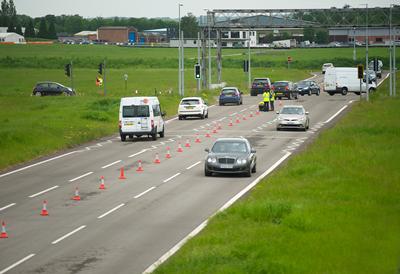Scientists investigate using artificial intelligence for next-generation traffic control
Researchers at the University of Southampton are investigating the application of artificial intelligence (AI) technology for controlling traffic lights.

The development of artificial intelligence-based approaches to junction control is one of many new and promising technologies that can make better use of existing urban and road capacity, while reducing the environmental impacts of road traffic.
The research carried out by the University of Southampton team has used computer games and simulations to investigate what makes good traffic control. This work has shown that – given the right conditions – humans are excellent at controlling the traffic and can perform significantly better than the existing urban traffic control computers in use today.
This was tested for the BBC’s ‘One Show’ programme, where presenter Marty Jopson controlled a ‘real traffic light junction at the InnovITS proving ground using a laptop, while 30 volunteer drivers tried to negotiate the junction. Watch the programme on BBC iPlayer (Item at 18.00).
Dr Simon Box of the University of Southampton Transportation Research Group says: "The demonstration carried out at innovITS Advance indicates that the human brain, carefully employed, can be an extremely effective traffic control computer. In our research we aim to be able to emulate this approach in a new kind of software that can provide significant benefits in improving the efficiency of traffic flow, hence improving road space utilisation, reducing journey times and potentially, improving fuel efficiency."
The Southampton researchers have now developed ‘machine learning’ traffic control computers that can learn how to control the lights like a human would and even learn their own improved strategies through experience.
"In transport research we are always looking ahead, and we can consider a future where all vehicles are equipped with WiFi and GPS and can transmit their positions to signalized junctions," explains Dr Box. "This opens the way to the use of artificial intelligence approaches to traffic control such as machine learning." The research was originally funded by the Engineering and Physical Sciences Research Council (EPSRC) and is currently continuing under Technology Strategy Board funding, with Siemens as an industrial partner.
What's related
Intelligent traffic systems
As Britain’s roads get busier and busier, we need intelligent and sustainable solutions to keep traffic flowing swiftly and safely. Members of the University of Southampton’s Transportation Research Group (TRG) are investigating ways of improving how we get around our cities and exploring how to cut congestion on motorways and major trunk roads. Their expertise is also in demand around the world from transport planners who want to avoid gridlock in their communities.
Find out moreNotes for editors
- There are two published journal papers relating to this research:
http://www.sciencedirect.com/science/article/pii/S0952197611001618
http://www.sciencedirect.com/science/article/pii/S0952197612000504 - For more details about the simulations and games that were used in the research, please visit Dr Box’s website: http://www.simonbox.info/index.php/transportation/79-toplevel/projects/transportation/74-machine-learning-in-junction-control
- There is a video of the game being played here: http://youtu.be/dB3zoGJiODk
innovITS is the UK ITS (Intelligent Transport Systems) Centre for Excellence for Transport Telematics and Technology for Sustainable Mobility. It was set up by the UK Government’s Department for Business, Innovation and Skills(BIS) as a non-profit making organization in 2005 and has the fundamental objective of achieving a world-class position for the UK ITS industry. innovITS brings together expertise from the Automotive, Highways and Telecommunications industries to build collaborative partnerships, seeking out inventive telematics technologies to integrate on a realistic scale and validate that it delivers value to road users and transport operators. As a result, it acts as a catalyst for the subsequent promotion, deployment and commercial exploitation of these technologies and technology providers on a global scale. innovITS – ADVANCE is the result of a collaboration between innovITS, MIRA Ltd, one of the world’s leading automotive design and development organisations, and TRL, the UK’s internationally recognised Transport Research Laboratory, a leader in research and development of ITS solutions and strategic applications. The facility is hosted at the Nuneaton headquarters site of MIRA. - Siemens are the industrial partner in the current research. http://www.siemens.co.uk/traffic
InnovITS, MIRA and TRL all jointly assisted in the use of their proving ground for the experiment: http://www.innovits.com/advance/ - The University of Southampton is celebrating its 60th anniversary during 2012.
Her Majesty Queen Elizabeth II, granted the Royal Charter that enabled the University of Southampton to award its own degrees in the early weeks of her reign in 1952.
In the six decades to follow, Southampton has risen to become one of the leading universities in the UK with a global reputation for innovation through academic excellence and world-leading research.
This year, the University’s reputation continues to grow with the recent awarding of a Queen’s Anniversary Prize for Higher and Further Education in recognition of Southampton’s long-standing expertise in performance sports engineering. To find out more visit https://www.southampton.ac.uk/60
For further information contact:
Glenn Harris, Media Relations, University of Southampton, Tel: 023 8059 3212, email: G.Harris@soton.ac.uk
https://www.southampton.ac.uk/mediacentre/
Follow us on twitter: http://twitter.com/unisouthampton
Like us on Facebook: http://www.facebook.com/unisouthampton